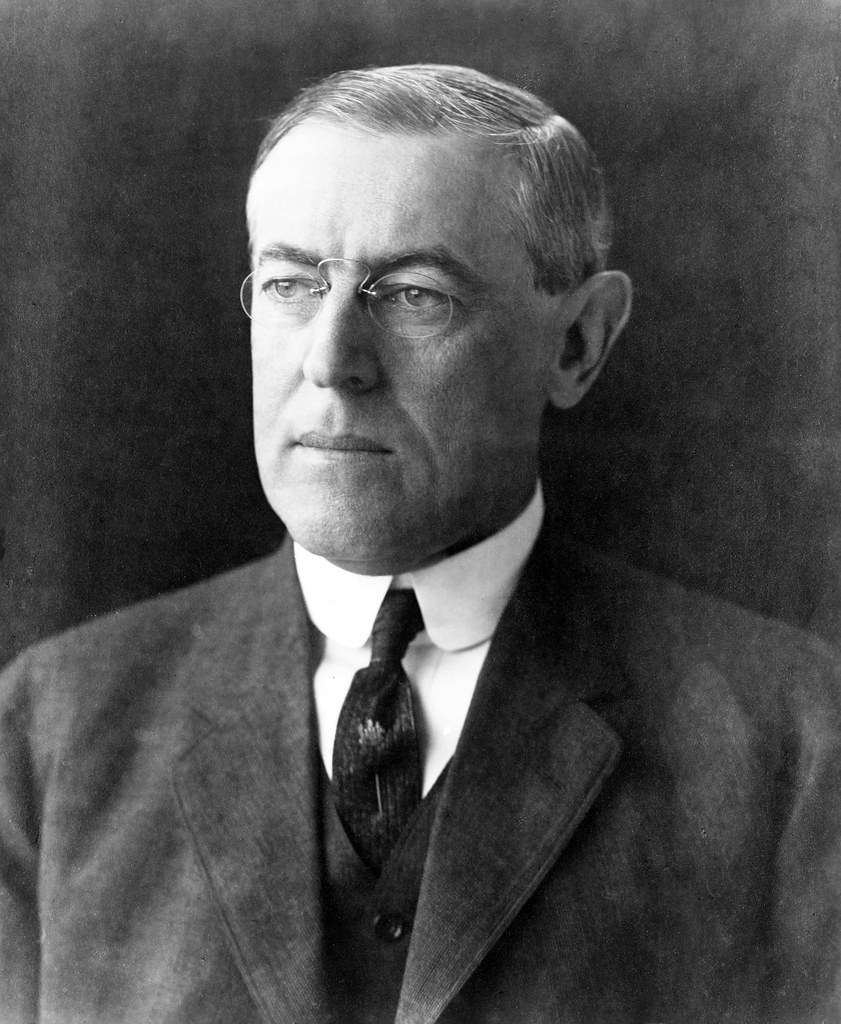REVIEW POTPOURRI: Thomas Woodrow Wilson
 by Peter Cates
by Peter Cates
Thomas Woodrow Wilson
The 28th president, Thomas Woodrow Wilson (1856-1924), had been a professor of history and president of Princeton University before being lured into New Jersey Democratic party politics, and he soon found out that he enjoyed politics a lot . In the three-way race of 1912, Taft and Roosevelt split the vote among Republicans, thus assuring Wilson the White House.
A little more background: Wilson was the son of a Presbyterian minister, was born in Virginia but spent most of his childhood in Georgia where his father had taken another church position and moved the family.
He got degrees from Princeton and Johns Hopkins and studied enough law at the University of Virginia Law School and through home study to get admitted to the bar in Georgia where he practiced for a short period of time.
But he was drawn back to academic life and taught at both Bryn Mawr College, in Pennsylvania, and Wesleyan University, in Connecticut, after which he was offered a professorship at Princeton in 1890 .
Wilson wrote at least nine books and numerous articles; I highly recommend his five volume The History of the American People, published between 1901-1902, which I own and read most of, finding his narrative gifts superb.
After teaching there for 12 years, Woodrow Wilson was appointed president of Princeton, in 1902, and brought about a reorganization of the curriculum with an emphasis on campus life being one of serious study and not socializing. But he absolutely would not allow any African-Americans admission.
In 1910 Wilson was elected governor of New Jersey and served for two years before he was elected president of the United States.
Wilson had a world view mixture of Deep South Confederacy racism as a believer in segregation, progressivism when it came to such issues as workman’s compensation, regulation of public utilities and cronyism in government and, later in his presidency, internationalism in his pro-active participation in the Paris peace talks and his fight to establish the League of Nations. There is a vast amount of material on the pros and cons of his eight years in the White House, in particular his last two years after suffering a series of strokes.
Wilson was married first to Ellen Axson (1860-1914) who was studying art in New York City but gave it up to be a wonderful helpmate to her husband and gave birth to three daughters, Margaret, Jessie, and Eleanor.
Jessie married a Harvard professor Francis Sayre, Eleanor her father’s Secretary of the Treasury William McAdoo, while Margaret remained single indulging her love of culture and beauty (a photograph shows her listening to records which resonated with yours truly on a very personal level.).
In 1915, Wilson met a widow Edith Bolling Galt (1872-1961), and initiated an ardent courtship; by December, they were married.
After Wilson’s incapacitating strokes, the country was pretty much being secretly run by the First Lady, Wilson’s physician Dr. Cary Grayson and his private secretary Joe Tumulty while Vice-President Thomas Marshall was kept out of the loop.
After leaving the White House in 1921, the couple moved to a house on S Street which has since become a tourist attraction.
On Veterans Day in 1923, the former president summoned enough strength to give a brief speech to people gathered in front of his house in which he stated:
“I have seen fools resist Providence before and I have seen their destruction, and it will come upon these again, utter destruction and contempt; that we shall prevail is as sure as that God reigns.”
On February 3, 1924, Woodrow Wilson died at the age of 67; his successor Warren G. Harding had passed away the previous August and been succeeded by Calvin Coolidge, who was among the tiny group of mourners at Wilson’s funeral held at the S Street residence.
Responsible journalism is hard work!
It is also expensive!
If you enjoy reading The Town Line and the good news we bring you each week, would you consider a donation to help us continue the work we’re doing?
The Town Line is a 501(c)(3) nonprofit private foundation, and all donations are tax deductible under the Internal Revenue Service code.
To help, please visit our online donation page or mail a check payable to The Town Line, PO Box 89, South China, ME 04358. Your contribution is appreciated!



Leave a Reply
Want to join the discussion?Feel free to contribute!